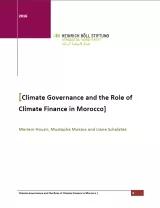Climate Governance and the Role of Climate Finance in Morocco
In November 2016, Morocco hosts the COP 22 which carries many hopes by the international community for advancing quickly with the operationalization of the new global climate agreement adopted at COP 21 in Paris in 2015. As a country very vulnerable to climate change due to its geographically exposed location at the northeast corner of the African continent, the Kingdom of Morocco has very high ambitions for low-carbon and climate-resilient development as well as the social transformations that their implementation will entail. Morocco, which has received significant climate finance support from the international community, is also widely recognized for its global leadership in committing to a renewable energy future and the country's ambitions to significantly expand domestic production in this area, particularly with respect to Concentrated Solar Power (CSP) and wind technologies. This trendsetter and leadership positioning of Morocco in climate action naturally has implications across the Middle Eastern and North African (MENA) region and more widely for the African continent as a whole.
This study is the result of collaboration between the Heinrich Böll Stiftung offices in Rabat and Washington, DC. It examines Morocco's vulnerability to climate change, the country's current and proposed energy mix (use and needs, accessibility, distribution, affordability), and its climate ambitions (expressed for example in its Nationally Determined Contribution, INDC, and other national climate and development plans). The study also highlights the role international climate finance flows have played in advancing Morocco’s climate ambition and analyses how the financing of the fight against climate change in Morocco is governed and implemented. It looks at the degree to which national stakeholders, as well as the people and communities most affected by climate change, including Morocco’s women and girls, participate in the decision-making and climate governance implementation process. The study closes with a set of recommendations suggested to improve climate finance governance in Morocco, focusing in particular on strengthening stakeholder participation and inclusiveness.
The study is available in French on the hbs North Africa Rabat website
